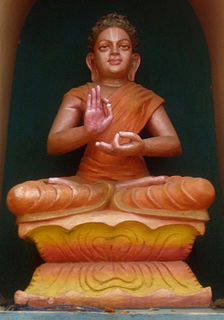This article has multiple issues. Please help improve it or discuss these issues on the talk page . (Learn how and when to remove these template messages) (Learn how and when to remove this template message)
|
The Religion of India: The Sociology of Hinduism and Buddhism is a book on the sociology of religion written by Max Weber, a German economist and sociologist of the early twentieth century. The original edition was in German under the title Hinduismus und Buddhismus and published in 1916. [1] An English translation was made in 1958 and several editions have been released since then.

Sociology of religion is the study of the beliefs, practices and organizational forms of religion using the tools and methods of the discipline of sociology. This objective investigation may include the use of both quantitative methods and qualitative approaches such as participant observation, interviewing, and analysis of archival, historical and documentary materials.

Maximilian Karl Emil Weber was a German sociologist, philosopher, jurist, and political economist. His ideas profoundly influenced social theory and social research. Weber is often cited, with Émile Durkheim and Karl Marx, as among the three founders of sociology. Weber was a key proponent of methodological anti-positivism, arguing for the study of social action through interpretive means, based on understanding the purpose and meaning that individuals attach to their own actions. Unlike Durkheim, he did not believe in mono-causality and rather proposed that for any outcome there can be multiple causes.

An economist is a practitioner in the social science discipline of economics.
Contents
- The Hindu social system
- Hindu orthodoxy and Brahmin restoration
- Secular ethic and impact of Hindu beliefs on economy
- Asian belief systems
- See also
- References
It was his third major work on the sociology of religion, after The Protestant Ethic and the Spirit of Capitalism and The Religion of China: Confucianism and Taoism . In this work he deals with the structure of Indian society, with the orthodox doctrines of Hinduism and the heterodox doctrines of Buddhism, with the changes wrought by popular religiosity and their influence on the secular ethic of Indian society. [2]

The Protestant Ethic and the Spirit of Capitalism is a book written by Max Weber, a German sociologist, economist, and politician. Begun as a series of essays, the original German text was composed in 1904 and 1905, and was translated into English for the first time by American sociologist Talcott Parsons in 1930. It is considered a founding text in economic sociology and sociology in general.
The Religion of China: Confucianism and Taoism is a book written by Max Weber, a German economist and sociologist. It was first published in German under the title Konfuzianismus und Taoismus in 1915 and an adapted version appeared in 1920. An English translation was published in 1951 and several editions have been released since.

A society is a group of individuals involved in persistent social interaction, or a large social group sharing the same geographical or social territory, typically subject to the same political authority and dominant cultural expectations. Societies are characterized by patterns of relationships between individuals who share a distinctive culture and institutions; a given society may be described as the sum total of such relationships among its constituent of members. In the social sciences, a larger society often exhibits stratification or dominance patterns in subgroups.










